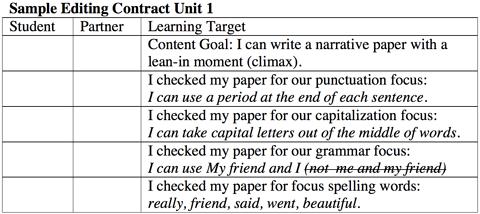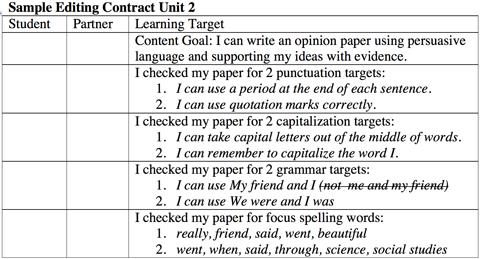What is considered to be an error has differed from one decade to another, and what seems like a serious error to one person... may not bother other individuals. – Constance Weaver
Review the workshop timeline
Students draft for a couple weeks. Each selects a piece to share and publish. All writers discuss what works and listen to suggestions for improving the writing with his/her peers in a revision circle. The meaning of the writing is as clear as the writer is capable. Now it’s time to edit and get ready to share the creation with an audience.
The Impetus
A long time ago I noticed that my spelling and grammar assignments weren’t working. Students could score a 100% on a spelling or grammar test, but the learning was not evident in their writing. I had to do something. What follows is an explanation of strategies I use now because of a journey of change that culminated in using editing cycles. Right away though I started inventing spelling notebooks, differentiated grading, and editing circles. I owe a great deal to Constance Weaver, whose writing on the subject and visit to the UNC-Charlotte Writing Project affected me greatly. She spurred me to keep on my path, learning new and researched ways of teaching students to control spelling, grammar, and mechanics. I also owe a great debt to Sandra Wilde and more recently, Jeff Anderson, The Write Guy. On the right sidebar, you will find copies of my lessons in PDF format for you to download. I highly recommend you read these authors’ works to help you as well.
Editing Cycle Minilessons Centered on 4 Goals Per Unit
I only hold students accountable for the editing lessons I teach. Throughout a 4-week unit, I teach convention minilessons - about one a week - to address 4 goals with which the majority of my class struggles. I choose one learning target for each area for each unit. The learning builds from unit to unit.
- Punctuation Focus
- Capitalization Focus
- Grammar Focus
- High Frequency Spelling Words Focus
At the beginning of the unit, I assess my students. I find what targets most students need. The punctuation-learning target I choose might be: I can use a period at the end of each sentence. A common capitalization focus is: I can take capital letters out of the middle of words. A grammar target: I can begin a sentence with “My friend and I” instead of “Me and my friend”. From looking at student writing, I might determine that most of my students still misspell 5-8 high-frequency words like really, friend, said, went, and beautiful.
I revisit these targets throughout the unit with all students. I hammer home how to edit the mistakes by creating lessons that force students to focus on the same 4 goals day after day. In conferences, lessons and conversation, my students and I work on understanding and correcting the same punctuation, capitalization, grammar, and spelling goals. For example, we talk correctly, check personal work to see if the 4 targets are implemented correctly, examine student work, combine sentences, participate in editing circles, and work on editing invitations. I also mount posters in the room and make handouts for their daybooks. Students write in their own words how they will remember to use each target correctly.
Editing Contracts for the First Unit
I have come to believe that if we work on 4 learning targets for an entire unit instead of lots of mechanics and grammar exercises, students have greater success remembering and using my instruction throughout the year and into the next. At the end of the unit, they put their learning to use by checking their papers and those of their peers to be sure everyone nails those 4 goals perfectly. In return, I either try very hard to ignore the other problems in the paper because there are way too many to address at once. Also, I have not taught those editing skills to mastery yet. Or, I differentiate by asking more of some individuals through personal contracts. The last step students complete before making a published copy is to check their paper with their partner and their contract. They hand me their drafts, their final draft, and their editing contract.

Editing Contracts for the Second Unit
The beauty of the editing cycle system is that we continue to add new learning targets. For the second unit, students still are responsible for the first unit goals as well as the new second unit goals. By the end of the year, editing contracts are 64 goals long - or more depending on the ability of each student. If a whole school uses this system, the students have mastered 6 (years) x 64 goals minimum by the time they exit elementary school.

I now have a consistent system for teaching editing so that 4th-grade students control 85% of their grammar, mechanics, and spelling in their first drafts. This goal is reached by having supports in the room like spelling buckets, personal word walls, spelling notebook pages, posters, editing partners and groups. Most of all, students learn because I am teaching lessons with 4 specific goals in mind for each unit and then building on that learning each time we take on a new unit. I’m not asking students to memorize. They are using the targets in their daily writing and constructing an understanding of how and why they need to edit. I’m teaching the targets to mastery throughout the course of a month rather than flitting from one thing to another. In addition, I point out specific errors to students in conferences. I find this 1-1 teaching to be the most long lasting. When all elements are combined, the students learn and it is hard to find a misspelled word in first drafts by January.
Next: Narrative writing